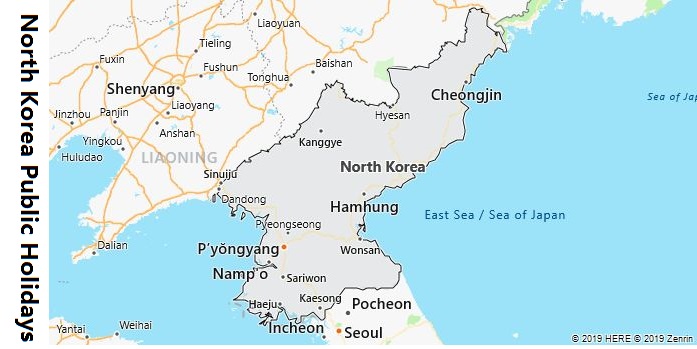North Korea Holidays
North Korea Public Holidays
Searching for the national holidays in North Korea? All public holidays in North Korea are treated like Sundays. This means that most of the North Korea employees have a day off and all schools are closed on these office holidays. If you are planning a trip to North Korea and want to know what the national and regional holidays are, check the details in the tables below.
List of Official Holidays in North Korea for Year 2020
| # | Date | Holiday | Day |
| 1 | January 01, 2020 | New Year’s Day | Wednesday |
| 2 | January 25, 2020 | Korean New Year | Saturday |
| 3 | February 09, 2020 | Tree Planting Day | Sunday |
| 4 | February 16, 2020 | Birth Day of Kim Jong Il | Sunday |
| 5 | March 08, 2020 | International Women’s Day | Sunday |
| 6 | April 05, 2020 | Chungmyung Day | Sunday |
| 7 | April 15, 2020 | Birth Date of Kim Il Sung | Wednesday |
| 8 | April 25, 2020 | Military Foundation Day | Saturday |
| 9 | May 01, 2020 | Labour Day | Friday |
| 10 | June 06, 2020 | Children’s Union Foundation Day | Saturday |
| 11 | July 27, 2020 | Day of Victory | Monday |
| 12 | August 15, 2020 | National Liberation Day | Saturday |
| 13 | August 25, 2020 | Day of Songun | Tuesday |
| 14 | September 09, 2020 | National Day | Wednesday |
| 15 | October 01, 2020 | Harvest Festival | Thursday |
| 16 | October 10, 2020 | Party Foundation Day | Saturday |
| 17 | December 27, 2020 | Constitution Day | Sunday |
List of Official Holidays in North Korea for Year 2021
| # | Date | Holiday | Day |
| 1 | January 01, 2021 | New Year’s Day | Friday |
| 2 | February 12, 2021 | Korean New Year | Friday |
| 3 | February 16, 2021 | Birth Day of Kim Jong Il | Tuesday |
| 4 | February 27, 2021 | Tree Planting Day | Saturday |
| 5 | March 08, 2021 | International Women’s Day | Monday |
| 6 | April 05, 2021 | Chungmyung Day | Monday |
| 7 | April 15, 2021 | Birth Date of Kim Il Sung | Thursday |
| 8 | April 25, 2021 | Military Foundation Day | Sunday |
| 9 | May 01, 2021 | Labour Day | Saturday |
| 10 | June 06, 2021 | Children’s Union Foundation Day | Sunday |
| 11 | July 27, 2021 | Day of Victory | Tuesday |
| 12 | August 15, 2021 | National Liberation Day | Sunday |
| 13 | August 25, 2021 | Day of Songun | Wednesday |
| 14 | September 09, 2021 | National Day | Thursday |
| 15 | September 21, 2021 | Harvest Festival | Tuesday |
| 16 | October 10, 2021 | Party Foundation Day | Sunday |
| 17 | December 27, 2021 | Constitution Day | Monday |















































